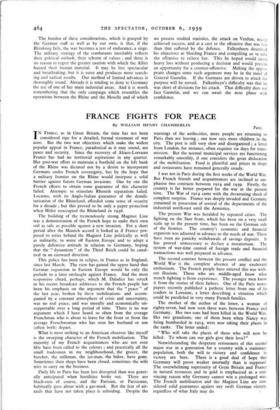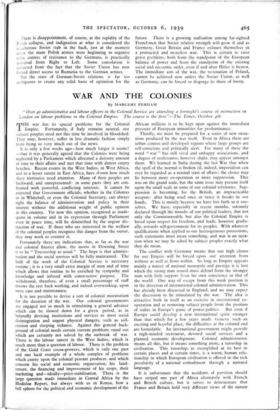FRANCE FIGHTS FOR PEACE
By WILLIAM HENRY CHAMBERLIN
Paris.
IN France, as in Great Britain, the time has not been considered ripe for a detailed, formal statement of war aims. But the two war objectives which make the widest popular appeal in France, paradoxical as it may sound, are peace and security. Since the recovery of Alsace-Lorraine France has had no territorial aspirations in any quarter. Her post-war effort to maintain a foothold on the left bank of the Rhine was dictated not by a desire to incorporate Germans under French sovereignty, but by the hope that a military frontier on the Rhine would interpose a solid barrier against future German invasions. One by one the French efforts to obtain some guarantee of this character failed. Attempts to stimulate Rhenish separatism failed. Locarno, with its Anglo-Italian guarantee of the demili- tarisation of the Rhineland, afforded some sense of security for a decade ; but this proved to be only a paper protection when Hitler reoccupied the Rhineland in 1936.
The building of the tremendously strong Maginot Line was a demonstration of the French hope to make their own soil as safe as possible against a new invasion. For a short period after the Munich accord it looked as if France pro- posed to retire behind the Maginot Line politically as well as militarily, to write off Eastern Europe and to adopt a purely defensive attitude in relation to Germany, hoping that the " dynamism " of the Third Reich could be canal- ised in an eastward direction.
This policy has been in eclipse, in France as in England, since last March. The view has gained the upper hand that German expansion in Eastern Europe would be only the prelude to a later onslaught against France. And the most responsive chord, perhaps, which M. Daladier has struck in his recent broadcast addresses to the French people has been his emphasis on the argument that the " peace " of the last year, broken by three mobilisations and accom- panied by a constant atmosphere of crisis and uncertainty, was no real peace, and was morally and economically un- supportable over a long period of time. There is no war argument which I have heard so often from the average Frenchman who is about to leave for the front or from the average Frenchwoman who has seen her husband or son (often both) depart.
What is most striking to an American observer like myself is the sweeping character of the French mobilisation. The majority of my French acquaintances who are not over fifty have been called to the colours ; and practically all the small tradesmen in my neighbourhood, the grocer, the butcher, the milkman, the ice-man, the baker, have gone. Sometimes their shops have been closed, sometimes the wife tries to carry on the business.
Daily life in Paris has been less disrupted than was gener- ally anticipated when hostilities broke out. There are black-outs of course, and the Parisian, or Parisienne, habitually goes about with a gas-mask. But the fear of air- raids that have not taken place is subsiding. Despite the warnings of the authorities, more people are returning to Paris than are leaving ; one now sees more children in the city. The post is still very slow and disorganised ; a letter from London, for instance, often requires six days for trans- mission. But the normal municipal services are functioning remarkably smoothly, if one considers the great dislocation of the mobilisation. Food is plentiful and prices in shops and restaurants have remained generally steady.
I was not in Paris during the first weeks of the World War. But French friends and acquaintances are inclined to em- phasise two contrasts between 1914 and 5939. Firstly, the country is far better prepared for the war at the present time. The War of 1914 came with the devastating shock of complete surprise. France was deeply invaded and Germany remained in possession of several of the departments of the industrial north-east until the Armistice.
The present War was heralded by repeated crises. The fighting on the Saar front, which has been on a very small scale up to the present time, has been on the German side of the frontier. The country's economic and financial organism was adjusted in advance to the needs of war. There have been no panicky withdrawals of savings deposits. It has proved unnecessary to declare a moratorium. The system of war-time control of foreign trade and financial transactions was well prepared in advance.
The second contrast between the present conflict and the World War is the complete absence of any exuberant enthusiasm. The French people have entered this war with- out illusions. Those who are middle-aged know what trench fighting is from experience. The younger men know it from the stories of their fathers. One of the Paris news- papers recently published a pathetic letter from one of its readers in Lorraine, a letter describing a situation which could be paralleled in very many French families.
The mother of the author of the letter, a woman of eighty-seven, had now seen three wars between France and Germany. Her two sons had been killed in the World War. Her two grandsons, one of them born when Nancy was being bombarded in 1914, were now taking their places in the ranks. The letter ended: " Who will take the places of those who will now he killed. To whom can our girls give their love?"
Notwithstanding the desperate seriousness of this second major war in a generation for a country with a stationary population, both the will to victory and confidence in victory ate here. There is a good deal of hope that Germany will prove weaker internally than is supposed. The overwhelming superiority of Great Britain and France in natural resources and in gold is emphasised as a con- vincing reason why Germany cannot win a prolonged war. The French mobilisation and the Maginot Line are con- sidered solid guarantees against any swift German victory. regardless of what Italy may do. There is disappointment, of course, at the rapidity of the Polish collapse, and indignation at what is considered the treacherous Soviet stab in the back, just at the moment whon the main Polish armies were beginning to organise some centres of resistance to the Germans, is practically universal from Right to Left. Some consolation is extracted from the fact that the Soviet Union has now barred direct access to Rumania to the German armies.
But the state of German-Soviet relations is far too ambiguous to create any solid basis of optimism for the future. 'There is a growing realisation among far-sighted Frenct men that Soviet relative strength will grow if and as Germany, Great Britain and France exhaust themselves in a protracted and merciless war. This is certain to raise grave problems, both from the standpoint of the European balance of power and from the standpoint of the existing social and ecctionic order, even if and after Hitler is beaten. The immediate aim of the war, the restoration of Poland, cannot be achieved now unless the Soviet Union, as well as Germany, can be forced to disgorge its share of booty.



































 Previous page
Previous page